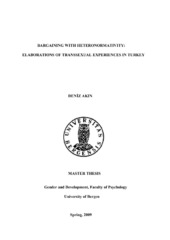Bargaining with Heteronormativity: Elaborations of Transsexual Experiences in Turkey
Master thesis
Permanent lenke
https://hdl.handle.net/1956/4783Utgivelsesdato
2009-05-25Metadata
Vis full innførselSamlinger
Sammendrag
After gaining legal status in 1988, Turkey's transsexual people have become more visible. Especially in the music sector, transsexual stage performers have gained considerable popularity. However, there is limited opportunity for the transsexual community to have access to livelihoods except in the entertainment sector which is already difficult to become involved in. In other words, oppression and marginalization of transsexual people in Turkey have been continuing despite the restricted alternatives available for them. Assuming that the dominant gender ideologies in Turkey are heteronormative, the major objective of this research was to elaborate the influence of heteronormativity, which is (re)produced by regulatory mechanisms in Turkey, on the lives of transsexual people. Findings of this research demonstrate that heterosexist gender binaries are constraining transsexuals' lives both at the institutional level and the individual level. Institutionally, state, legislations and military are described to be the major regulatory mechanism that perpetuate the dominant gender ideologies and shape the life options of transsexuals in Turkey. It is argued that the legal recognition of transsexuality, that is, their right to have sex-reassignment surgery and their right to change the sex' status on their identity card, does not necessarily bring about their liberation in Turkey. In contrast, the gendered discourse which is reinforced by the regulatory mechanisms perpetuates the condemnation of transsexuals in the country. At the individual level, the research findings demonstrate that the pervasive constraints of heteronormativity are internalized by the transsexuals both in their wishes and their behaviour. Hence, the majority of the transsexuals do not develop strategies that would entirely contribute to the "liberation" of their sexual identity but generate short-term solutions to live out their transsexuality.
Utgiver
The University of BergenOpphavsrett
Copyright the author. All rights reservedThe author
